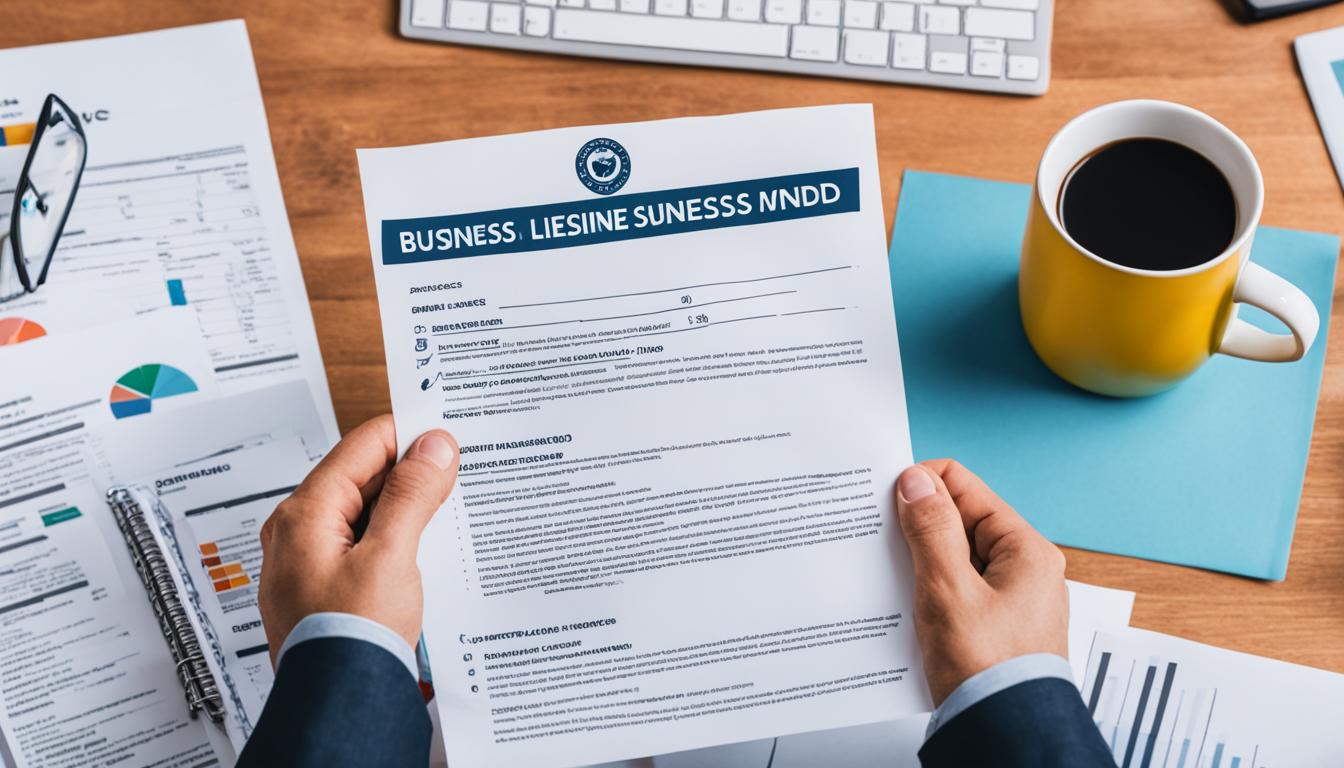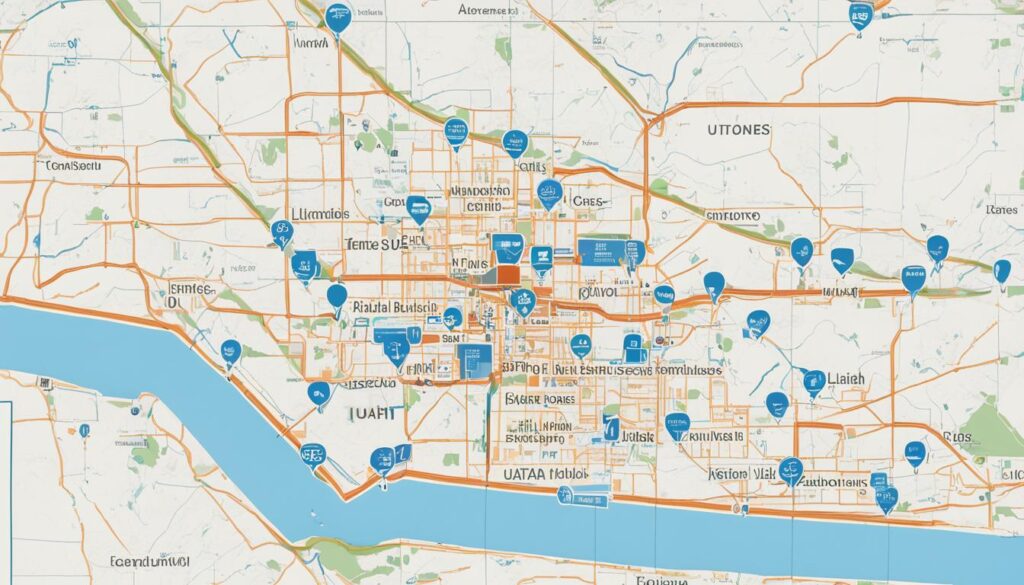Embarking on a print on demand (POD) journey might have you wondering, “do I need a business license for print on demand?” It’s a valid question, especially as you start to navigate the complexities of establishing an online store. Acquiring a business license for print on demand isn’t just about legality; it’s about playing by the rules and understanding the adherence needed for the legal regulations for print on demand.
Your drive to turn creative designs into a profitable business on platforms like Etsy must also include a dose of due diligence. Whether you’re dabbling in custom t-shirts or niche artwork, the distinction between hobby and business comes with its set of responsibilities—including local sales tax policies, government laws, and the business activities that may signal the need for a license. It’s crucial you’re informed about what your growing enterprise requires to stay on the right side of the law.
Key Takeaways
- Understanding if your POD venture requires a business license is critical to operating legally.
- Local tax laws and specific business operations could mandate licensing depending on your region.
- Online sellers may experience different regulations compared to physical storefronts but are not exempt from compliance.
- Consultation with your Secretary of State or local county clerk can clarify specific licensing needs for your business.
- Factor in location-specific tax regulations when considering the cost and process of obtaining a business license.
Understanding Business Licensing for Print on Demand Ventures
Embarking on a print on demand venture means you’re part of the ever-expanding eCommerce universe—a space filled with opportunity, innovation, and yes, regulations. To ensure you’re playing by the rules, it’s crucial to have a firm grasp on the licensing requirements for print on demand businesses.
What Is a Business License?
A business license is your ticket to operate legally within your local jurisdiction. Think of it as an official nod from the government, giving you the permission to embark on your commercial journey. This formality not only keeps you compliant but also embeds a layer of credibility to your print on demand operation.
Situations That May Require a Business License for POD
- If your print on demand activities cross a certain threshold of sales, you might be required to apply for a seller’s permit.
- Should you decide to expand your business structure beyond sole proprietorship, obtaining an Employer Identification Number (EIN) becomes imperative.
- Running your POD business from home? A home occupation permit may be on the checklist.
- Aside from these, a general business operation license is a common starting point for most entrepreneurial endeavors.
Remember, as you navigate through platforms such as Etsy, understanding business license for print on demand becomes essential, especially when your store starts to gain traction and profits increase.
Print on Demand: A Special eCommerce Consideration
Print on demand businesses bear unique eCommerce considerations. Your bespoke creations—whether they be t-shirts, mugs, or art prints—are produced per order, blurring the lines between traditional retail and modern digital commerce. This model beckons a tailored approach towards print on demand licensing guidelines and licensing requirements for print on demand, as each item you sell passes through a virtual checkout that’s bound by specific laws and regulations.
The Role of Local Sales Tax Policies in Business Licensing
When diving into the realm of print on demand, understanding local sales tax policies is not just a recommendation—it’s essential. These policies can significantly determine whether you need to apply for a business license for your POD venture. To navigate this landscape, you must recognize that each region carries its own set of rules and business licensing regulations informed by local sales tax policies.
It’s crucial that you discern whether your products are categorized as digital or physical because they are often subject to different tax treatments. What’s more, you may find that your POD business is expected to collect and remit sales taxes from customers, which further emphasizes the importance of a business license. Let’s break down how these components interact with each other in the context of print on demand.
- Investigate regional print on demand licensing laws — Not all sales tax policies are made equal, and it’s your responsibility to uncover what holds true for your local area.
- Understand product classification — Different rules may apply for digital versus physical products, affecting tax liability and licensing needs.
- Sales tax collection duties — Determine if you’re obliged to handle sales taxes, which is frequently a trigger for requiring formal business registration and licensing.
For every print on demand entrepreneur eager to run a compliant business, addressing these facets of local sales tax and business licensing is a non-negotiable step in the process. Grasping the implications of these laws will help you establish a strong foundation for your business and safeguard you against any unwelcome legal surprises.
Whether you’re just starting or are already knee-deep in your POD journey, taking the time to ensure you’re well-informed about these policies will pay dividends. If collecting sales tax is part of your mandate as a POD business owner, then swiftly moving to apply for a business license POD-oriented might not just be an option, but a legal obligation.
Remember, staying ahead of the curve when it comes to local sales tax policies and business licensing isn’t just about adhering to the law—it’s about protecting your passion and your profits. So take the necessary steps today to ensure your print on demand business is built on solid legal ground tomorrow.
Deciphering Legal Regulations for POD Businesses
As you dive into the world of print on demand, understanding the mosaic of legal requirements is critical for your success. Staying informed about the print on demand business license information can help you navigate the intricacies of the law and operate your business without hiccups. Whether you’re wondering, “do I require a business license for POD?” or looking to ensure you’re up to date on regional mandates, this section unpacks the nuances for a smoother entrepreneurial journey.

Research Is Key: Understanding Regional Laws
Every region has its own set of rules that govern commercial activities. Engaging in diligent research is the first step towards comprehending these laws. Here’s what you should focus on:
- Local business operation permits
- Seller’s permits for e-commerce transactions
- Sales tax licenses pertinent to online sales
- Regulations for home-based businesses if you’re operating from your residence
Your due diligence doesn’t stop after initial research; it’s an ongoing endeavor to keep abreast of evolving laws that could impact your POD operation.
Navigating the Complexity of Online Selling Laws
The digital landscape comes with its unique legal context. Here what you need to consider:
- Interstate commerce laws that are applicable when selling to customers in different states.
- International selling standards if your business scales beyond U.S. borders.
- Specific product regulations that could require additional permits or documentation.
The print on demand model places your business within a dynamically shifting legal framework, often requiring you to harmonize with laws and regulations that didn’t exist a few years ago. Keeping yourself informed is not just beneficial; it’s a necessity to thrive.
How Much Does a Business License Cost?
Stepping into the realm of print on demand (POD) business means understanding not just the creative process but also the monetary implications—specifically, the cost of a business license for POD. Whether you’re looking to curate custom apparel or distinctive home decor, grasping the financial part of licensing is as crucial as your designs. Let’s take a deeper dive into the expenses that may accompany your online store’s legalization.
The Cost Varies by Location and Business Type
If you’re mapping out your budget, you’ll soon find that the business license fees for online stores can be as varied as the patterns you print. Depending on where your business calls home and the nature of your products, the fees may fluctuate. Here’s a brief overview of factors that might tip the scales on costs:
- Different states come with different price tags for their licenses.
- The scope of your operations can mean the difference between a basic permit and a more specialized, costlier one.
- Running your empire from home might reduce costs, but it doesn’t eliminate them entirely.
Renewal Fees and Hidden Costs
One-off payments are rare in the business world, and the licensing realm is no exception. Apart from the initial outlay, there’s the ongoing conversation of renewals. The tick-tock of renewal fees can add up, quietly nudging your expenditure upward. Add to that the potential for hidden costs, such as processing fees, and you’ll want to keep a watchful eye on your budget. Stay informed of every expense that may cross your path and be ready for:
- Annual or biennial renewal fees that ensure your license stays valid.
- Additional permits specific to your business type, which might not be immediately apparent at the outset.
It’s imperative for your POD venture to stay compliant without costing you an arm and a leg. Keep these pointers in mind, and you’ll navigate the licensing requirements for print on demand cost with confidence and clarity.
Do I Need a Business License for My Etsy Print on Demand Store?
If you’re running an Etsy print on demand (POD) store, understanding the legalities of your business structure is critical. With the platform’s reach and the direct-to-customer sales model, it’s easy for your hobby shop to quickly become a full-fledged business. And yes, as you scale up and accumulate profit, getting a business license for Etsy POD becomes imperative to remain compliant with state and federal regulations.
Not all sellers will need a business license immediately. However, if you’re seeing an uptick in sales and are serious about pursuing your Etsy POD shop as a legitimate business, legalizing your operations with an Etsy print on demand store license isn’t just smart—it’s necessary. Consider the following:
- **Sales Thresholds**: Once you surpass a certain number of transactions or revenue figure, your state might require you to hold a valid business license.
- **Type of Goods**: Whether you’re selling physical products or digital downloads can affect the type of license you’ll need.
- **Location**: Regulations are not uniform across all jurisdictions. Check your local and state laws to understand the specific requirements for a business license for Etsy POD in your area.
Bolster your legitimacy by equipping your store with the necessary licenses. Depending on your situation, you may need a range of permits from a general business operations license to a seller’s permit. Always ensure your business model aligns with local laws and that your tax obligations are clear. This due diligence will pay off in the long run, safeguarding your hard work from any legal complications.
Remember, each decision you make for your Etsy shop contributes to your brand’s reputation and growth potential. Staying on top of your licensing needs demonstrates professionalism to both your customers and the authorities regulating your industry. If you’re unsure where to start, reach out to your local small business development center—they’re an invaluable resource for navigating your legal responsibilities as an Etsy POD seller.
Print on Demand Licensing Laws: When You Absolutely Need a Permit
As you deepen your foray into the print on demand (POD) industry, understanding when you need a permit becomes paramount. The nuances in licensing laws are subtle yet critically important, especially as you navigate the differentiation between physical and digital goods and the stringent requirements for federally controlled products.
Handling Physical versus Digital Goods
Let’s start by distinguishing between physical and digital offerings. The licensing laws for POD physical vs digital products licensing often take sharply contrasting paths. Typically, physical goods are taxable, leading many states to require a sales tax permit or a seller’s permit. This is where things get tricky—if you’re selling physical items, the necessity for proper documentation can’t be overstated.
Conversely, digital goods may not always be subject to the same sales tax regulations, potentially minimizing the licensing requirements. However, this doesn’t imply a free-for-all. Always verify the laws in your specific jurisdiction, as they can be as diverse as the products you’re selling.
What if You Sell Federally Controlled Products?
Now, let’s discuss permits for federally controlled goods. If your product range includes items like food, health supplements, or others governed by federal agencies, brace yourself for an additional layer of complexity. These products often demand permits from federal agencies such as the Food and Drug Administration (FDA). Ensuring compliance with federal laws is a must to avoid substantial fines and legal hurdles.
For those in the POD space handling federally regulated items, it’s not so much a question of if you need a permit, but rather which ones, how many, and how to stay compliant with ongoing regulations.

In conclusion, delving into print on demand licensing laws may feel overwhelming, but it’s a critical step in legitimizing and safeguarding your business. Whether you offer physical products, digital creations, or federally controlled goods, your due diligence today will pave the way for a well-established, legal business tomorrow.
Do I Need a Business License for Print on Demand? Factors to Consider
Embarking on a Print on Demand (POD) enterprise presents you with a myriad of decisions, especially when it comes to legalities. As you navigate this exciting journey, it’s critical to understand how your business model significantly influences your licensing needs and the potential repercussions of overlooking this fundamental step.
The Impact of Your Business Model on Licensing
Your venture’s structure can either simplify or complicate licensing requirements. If you opt for a sole proprietorship, for example, you might delay the need for an Employer Identification Number (EIN). However, incorporating or hiring employees necessitates immediate attention to licensing particulars. Whether you’re an LLC or a growing team, the nuances of your business model impact POD licensing, demanding thorough analysis and proactive measures to secure the appropriate licenses.
Consequences of Not Having a Business License
Failing to acquire a business license can have severe implications, far beyond mere paperwork oversights. If you ignore the need for proper licensing, you’re risking substantial fines, and worse, you could see your business shuttered. The consequences of no business license for POD businesses aren’t taken lightly, and navigating federal and local regulations conscientiously safeguards not only your livelihood but also the integrity and future of your brand.
- Assess if your revenue has reached a threshold that mandates a business license.
- Consider the type of products you’re offering and the legal requirements attached to them.
- Determine local and federal guidelines specific to POD businesses to ensure compliance.
- Implement protocols for regular review of licensing laws, as they may update or change.
Keep in mind, your proactive steps towards understanding and adhering to business licensing regulations will set the foundation for a resilient and prosperous venture in the burgeoning world of Print on Demand.
From Hobby to Profit: Recognizing When You Transition into a Business
Embracing the journey from a casual pastime to a fully-fledged business can be thrilling but also requires serious consideration, especially when your print on demand (POD) hobby starts turning a profit. It’s critical to recognize the point at which your endeavor becomes a business in the eyes of the IRS, as this transition influences your responsibilities and the perception of your operations both legally and financially.
IRS Considerations for Hobbyists versus Businesses
When your print on demand activities move beyond a hobby, the IRS will have specific expectations regarding tax treatment. This distinction impacts how you’ll report income and expenses. As a business, you’re entitled to deduct legitimate business expenses which can reduce taxable income; however, these deductions are not as liberal for hobbies. It’s essential to understand the IRS tax considerations for POD, ensuring you’re on the right track with your filings and minimizing potential tax liabilities.
Protecting Your Business with Proper Licensing
To prevent legal issues and protect your interests, obtaining proper licensing for your POD business is a step you cannot afford to ignore. It’s an affirmation to the government, your customers, and yourself that you are serious about your business. Whether it’s a general business license or one specific to e-commerce, it safeguards your operation and aligns you with industry standards. As you transition from hobby to business, remember, securing the proper permits is not just about compliance; it’s a foundation for your business’s future sustainability and growth.
- Understand the tax benefits and obligations that come with business status.
- Research the necessary licenses required for your emerging business, including local and state permits.
- Consult with a tax professional to ensure your business meets all IRS requirements.
The Benefits of Operating with a Business License
Embarking on your print on demand (POD) venture brings excitement and opportunity. To reap the full benefits of a business license for POD, consider how this legal credential can power your growth and solidify your reputation in today’s marketplace.
Building Customer Trust through Legitimization
Customer confidence is key in e-commerce. When your POD business is licensed, it signals to customers that you’re committed to trustworthy and secure operations. This customer trust in licensed POD businesses acts as a seal of approval—encouraging them to choose you over unlicensed competitors and driving repeat business.
- Legitimization as a professional entity
- Greater confidence among customers making purchasing decisions
- Enhanced brand reputation through adherence to standard practices
Expanding Your Business with Confidence
Your business license paves the way for expansion. Whether you’re exploring new markets or scaling up your product line, licensing can offer the business expansion with licensing you’ve been aiming for—all without the worry of legal hurdles that could slow you down. Plus, business partners and investors often look for the security that comes with a licensed entity.
- Easier access to business loans and funding options
- Opportunities to partner with larger distributors or retailers
- Capability to venture into new product categories with the appropriate licensing
Conclusion
As you navigate the exciting yet complex terrain of print on demand, it’s imperative to consider the intricate web of regulations that dictate the need for a business license. The importance of being well-versed in local, state, and federal laws cannot be understated; it’s the backbone of running a legitimate and legal print on demand business. This journey requires a strategic approach, combining self-education and possible expert consultation with a mindfulness of your business’s specific characteristics—all converging to fulfill legal requirements.
Essential Takeaways for Your POD Business Licensing
Remember that the world of print on demand is vast and varied. Each decision you make—from the choice of products you offer to the structure of your business—plays a role in outlining your licensing obligations. Although not every print on demand business conclusion leads to the necessity of obtaining a business license, ignorance is not bliss in this venue. Operating without required licenses could expose you to audits, fines, or even the discontinuation of your business, underlining the importance of thoroughness in your approach.
Next Steps: Action Plan for Compliance
Developing a compliance action plan for POD is your next pivotal step. Start by delving into local licensing laws, identifying the parameters that govern your print on demand operations. Assess every angle—from sales volume to location—to ascertain whether your endeavor requires a business license. With this knowledge in hand, plan methodically to meet every standard, thus safeguarding the legal standing and future prosperity of your business. As you map out this plan, stay proactive, informed, and diligent to ensure a seamless journey in the print on demand industry.
FAQ
Do I need a business license for print on demand?
The requirement for a business license for print on demand (POD) varies based on your business model, sales volume, local sales tax policies, and legal regulations. While smaller hobbyist sellers may not need one immediately, it is important to research your local and state laws to determine if you need to apply for a business license as your POD business grows.
What is a business license?
A business license is an official permit that allows individuals or companies to conduct business within a certain jurisdiction. It grants legal recognition to the business, ensuring compliance with local governance and taxation laws.
Are there specific situations that require a business license for POD operations?
Yes, situations that might require a POD business to obtain a business license include, but are not limited to, reaching a certain threshold in sales, hiring employees, operating from a location that is zoned for business (like your home), and needing to collect sales tax from customers.
How do local sales tax policies affect the need for a business license in POD?
Local sales tax policies play a significant role as they determine whether you’re required to collect sales tax from your customers. Depending on your location, this might necessitate obtaining a seller’s permit or a sales tax license, which go hand-in-hand with a business license.
Why is it important to research and understand regional laws for my POD business?
Since legal regulations for operating an online business can vary widely across different jurisdictions, it is critical to understand the specific laws that apply to your POD business in your region. This ensures that you remain compliant with sales tax collection, business operation standards, and other legal obligations.
How much does a business license cost for a POD operation?
The cost of a business license for a POD operation can range from approximately to several hundred dollars depending on your location, the type of license you need, and whether you’re also applying for additional permits. Remember to also factor in the potential costs of annual renewal fees.
Do Etsy POD stores need a business license?
If you have an Etsy POD store, you may need a business license once your store begins to make consistent profits and operates on a scale beyond that of a casual hobby. It’s wise to check with Etsy’s guidelines in addition to your local and state laws for any specific requirements.
Are there different licensing laws for selling physical vs. digital products in POD?
Yes, licensing laws can differ between physical and digital products. Many regions impose sales tax only on physical goods, which may affect whether you need a business license and a seller’s permit. Always check the specific regulations for the types of products you sell.
What happens if I sell products that are federally regulated?
For POD items that fall under federal regulation, such as food products, you may need additional permits and to adhere to specific health and safety guidelines. Failing to obtain the necessary permits for these regulated items can result in serious legal consequences.
What should I consider to determine if I need a business license for my POD venture?
Consider factors such as your business structure, whether you’re generating a substantial income, the type of products you sell, and the legal implications of not having a license. Evaluate your individual business scenario and the penalties for operating without proper licensing to make an informed decision.
How do I recognize the transition from a hobbyist to a business owner in POD?
You can recognize the transition when you consistently generate profit, plan to expand, increase your sales volumes, and make deliberate investments to grow your store. This transition is also recognized by the IRS, which will have different tax implications for your activities.
What are the benefits of operating my POD business with a business license?
Operating with a business license can significantly increase your business credibility, which can lead to increased customer trust and higher sales. It also facilitates expansion into new markets, helps in introducing new products, and gives you the confidence to grow your business effectively.
What are the essential takeaways for handling POD business licensing?
The essential takeaways include understanding that a business license might not be necessary for all POD scenarios but knowing and adhering to your specific local, state, and federal regulations is pivotal. Being proactive about compliance helps to avoid legal issues and lays a solid foundation for your business’s success.
What should my next steps be to ensure compliance with licensing laws?
Begin by researching your local and state laws to understand the specific requirements for your POD business. Consider consulting with a legal expert if needed, and then create an action plan that aligns with your business model to address all necessary permits and licenses for full legal compliance.




